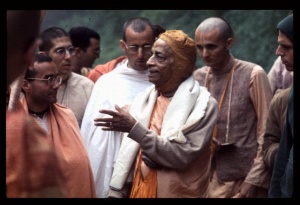CC Adi 1.59: Difference between revisions
m (1 revision(s)) |
No edit summary |
||
| Line 1: | Line 1: | ||
{{ | [[Category:Sri Caitanya-caritamrta - Adi-lila Chapter 01|C059]] | ||
<div style="float:left">'''[[Sri Caitanya-caritamrta|Śrī Caitanya-caritāmṛta]] - [[CC Adi|Ādi-līlā]] - [[CC Adi 1|Chapter 1: The Spiritual Masters]]'''</div> | |||
<div style="float:right">[[File:Go-previous.png|link=CC Adi 1.58|Ādi-līlā 1.58]] '''[[CC Adi 1.58|Ādi-līlā 1.58]] - [[CC Adi 1.60|Ādi-līlā 1.60]]''' [[File:Go-next.png|link=CC Adi 1.60|Ādi-līlā 1.60]]</div> | |||
{{CompareVersions|CC|Adi 1.59|CC 1975|CC 1996}} | |||
{{RandomImage}} | |||
==== TEXT 59 ==== | ==== TEXT 59 ==== | ||
<div | <div class="verse"> | ||
tato duḥsaṅgam utsṛjya | :tato duḥsaṅgam utsṛjya | ||
satsu sajjeta buddhi-mān | :satsu sajjeta buddhi-mān | ||
santa evāsya chindanti | :santa evāsya chindanti | ||
mano-vyāsaṅgam uktibhiḥ | :mano-vyāsaṅgam uktibhiḥ | ||
</div> | </div> | ||
| Line 14: | Line 18: | ||
==== SYNONYMS ==== | ==== SYNONYMS ==== | ||
<div | <div class="synonyms"> | ||
''tataḥ''—therefore; ''duḥsaṅgam''—bad association; ''utsṛjya''—giving up; ''satsu''—with the devotees; ''sajjeta''—one should associate; ''buddhi-mān''—an intelligent person; ''santaḥ''—devotees; ''eva''—certainly; ''asya''—one’s; ''chindanti''—cut off; ''manaḥ-vyāsaṅgam''—opposing attachments; ''uktibhiḥ''—by their instructions. | |||
</div> | </div> | ||
| Line 21: | Line 25: | ||
==== TRANSLATION ==== | ==== TRANSLATION ==== | ||
<div | <div class="translation"> | ||
“One should therefore avoid bad company and associate only with devotees. With their realized instructions, such saints can cut the knot connecting one with activities unfavorable to devotional service.” | “One should therefore avoid bad company and associate only with devotees. With their realized instructions, such saints can cut the knot connecting one with activities unfavorable to devotional service.” | ||
</div> | </div> | ||
| Line 28: | Line 32: | ||
==== PURPORT ==== | ==== PURPORT ==== | ||
<div | <div class="purport"> | ||
This verse, which appears in Śrīmad-Bhāgavatam ([[SB 11.26.26]]), was spoken by Lord Kṛṣṇa to Uddhava in the text known as the Uddhava-gīta. The discussion relates to the story of Purūravā and the heavenly courtesan Urvaśī. When Urvaśī left Purūravā, he was deeply affected by the separation and had to learn to overcome his grief. | This verse, which appears in ''Śrīmad-Bhāgavatam'' ([[SB 11.26.26]]), was spoken by Lord Kṛṣṇa to Uddhava in the text known as the ''Uddhava-gīta''. The discussion relates to the story of Purūravā and the heavenly courtesan Urvaśī. When Urvaśī left Purūravā, he was deeply affected by the separation and had to learn to overcome his grief. | ||
It is indicated that to learn the transcendental science, it is imperative that one avoid the company of undesirable persons and always seek the company of saints and sages who are able to impart lessons of transcendental knowledge. The potent words of such realized souls penetrate the heart, thereby eradicating all misgivings accumulated through years of undesirable association. For a neophyte devotee there are two kinds of persons whose association is undesirable: (1) gross materialists who constantly engage in sense gratification and (2) unbelievers who do not serve the Supreme Personality of Godhead but serve their senses and their mental whims in terms of their speculative habits. Intelligent persons seeking transcendental realization should very scrupulously avoid their company. | It is indicated that to learn the transcendental science, it is imperative that one avoid the company of undesirable persons and always seek the company of saints and sages who are able to impart lessons of transcendental knowledge. The potent words of such realized souls penetrate the heart, thereby eradicating all misgivings accumulated through years of undesirable association. For a neophyte devotee there are two kinds of persons whose association is undesirable: (1) gross materialists who constantly engage in sense gratification and (2) unbelievers who do not serve the Supreme Personality of Godhead but serve their senses and their mental whims in terms of their speculative habits. Intelligent persons seeking transcendental realization should very scrupulously avoid their company. | ||
</div> | </div> | ||
__NOTOC__ | |||
<div style="float:right; clear:both;">[[File:Go-previous.png|link=CC Adi 1.58|Ādi-līlā 1.58]] '''[[CC Adi 1.58|Ādi-līlā 1.58]] - [[CC Adi 1.60|Ādi-līlā 1.60]]''' [[File:Go-next.png|link=CC Adi 1.60|Ādi-līlā 1.60]]</div> | |||
__NOTOC__ | |||
__NOEDITSECTION__ | |||
Revision as of 18:17, 26 July 2021

A.C. Bhaktivedanta Swami Prabhupada
TEXT 59
- tato duḥsaṅgam utsṛjya
- satsu sajjeta buddhi-mān
- santa evāsya chindanti
- mano-vyāsaṅgam uktibhiḥ
SYNONYMS
tataḥ—therefore; duḥsaṅgam—bad association; utsṛjya—giving up; satsu—with the devotees; sajjeta—one should associate; buddhi-mān—an intelligent person; santaḥ—devotees; eva—certainly; asya—one’s; chindanti—cut off; manaḥ-vyāsaṅgam—opposing attachments; uktibhiḥ—by their instructions.
TRANSLATION
“One should therefore avoid bad company and associate only with devotees. With their realized instructions, such saints can cut the knot connecting one with activities unfavorable to devotional service.”
PURPORT
This verse, which appears in Śrīmad-Bhāgavatam (SB 11.26.26), was spoken by Lord Kṛṣṇa to Uddhava in the text known as the Uddhava-gīta. The discussion relates to the story of Purūravā and the heavenly courtesan Urvaśī. When Urvaśī left Purūravā, he was deeply affected by the separation and had to learn to overcome his grief.
It is indicated that to learn the transcendental science, it is imperative that one avoid the company of undesirable persons and always seek the company of saints and sages who are able to impart lessons of transcendental knowledge. The potent words of such realized souls penetrate the heart, thereby eradicating all misgivings accumulated through years of undesirable association. For a neophyte devotee there are two kinds of persons whose association is undesirable: (1) gross materialists who constantly engage in sense gratification and (2) unbelievers who do not serve the Supreme Personality of Godhead but serve their senses and their mental whims in terms of their speculative habits. Intelligent persons seeking transcendental realization should very scrupulously avoid their company.